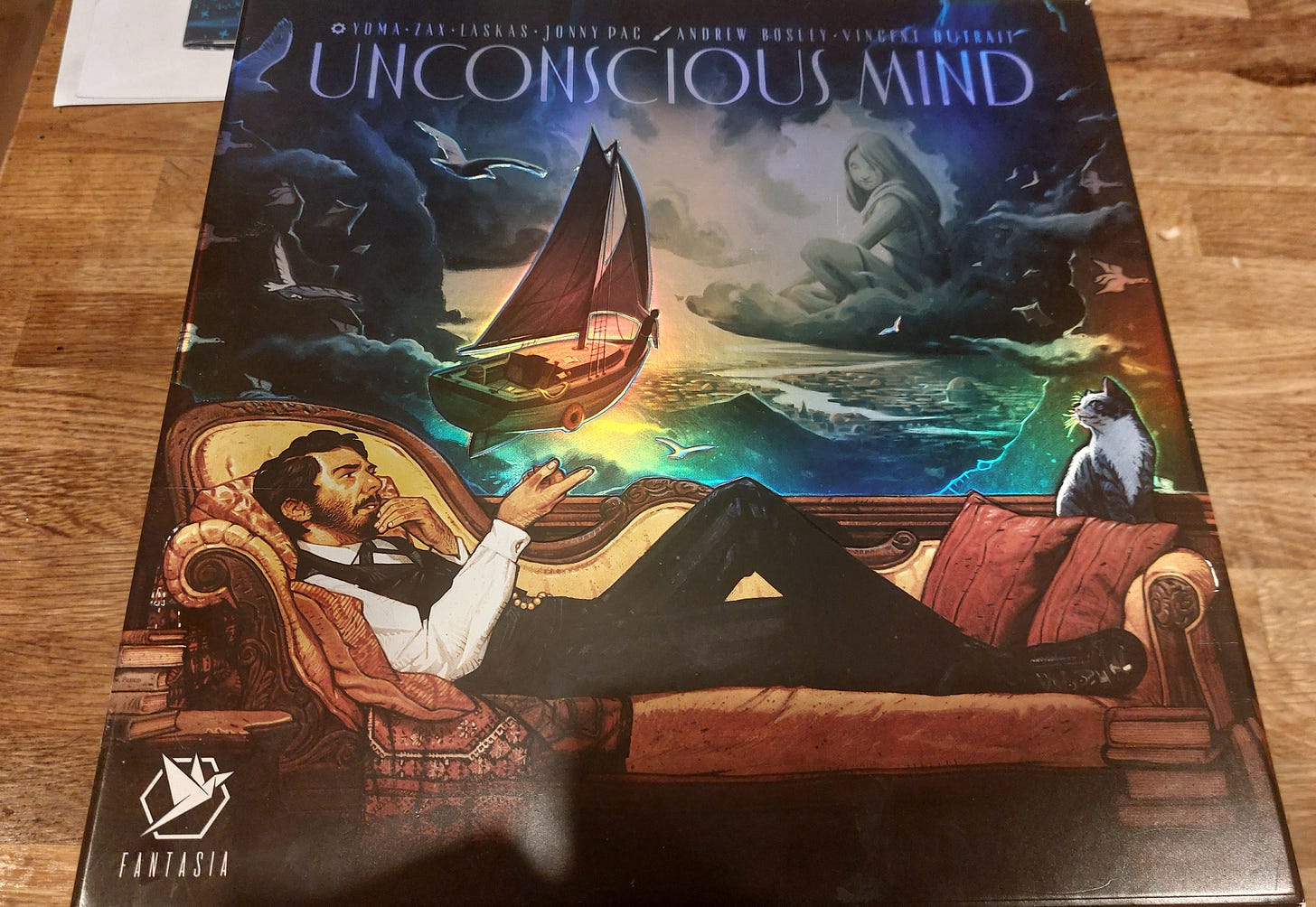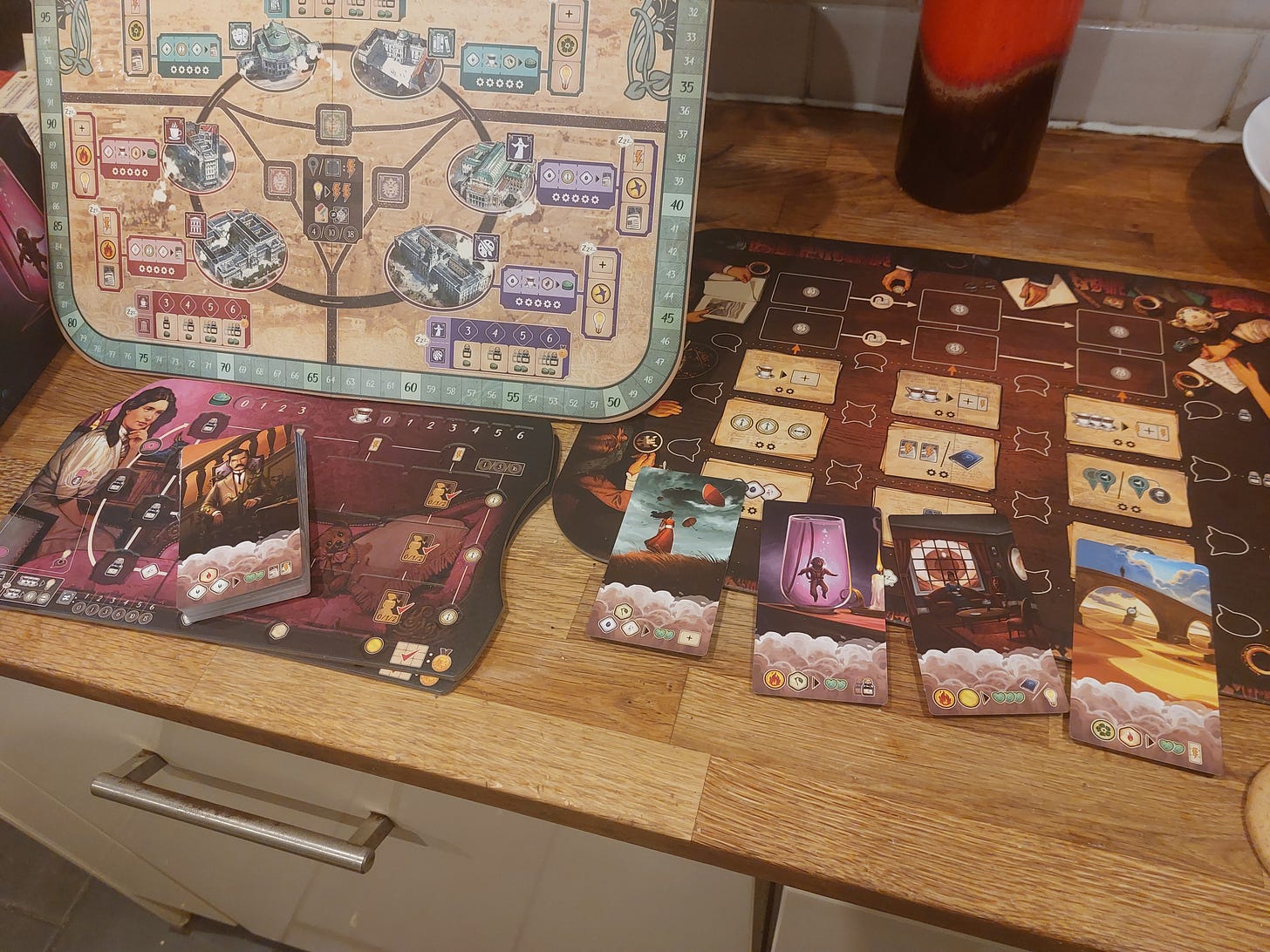There are various ways to evaluate a game- how well designed the systems are, how interesting the decisions, how pleasing the visual and tactile experience of play is. On all of these criteria, it is difficult to fault Unconscious Mind. So why did it leave me so cold?
Unconscious Mind purports to be about therapy- precisely, the birth of psychotherapy in the first years of the 20th century. Players represent different acolytes of the great Professor Freud, competing to effectively treat clients, write treatises and spread their reputation around Vienna.
Mechanically, it’s a mixed bag- a lot of the time you are placing tokens on a meeting board in order to take various actions, mostly around boosting and manipulating a currency of ‘insights’ that you will then spend on reducing your client’s trauma. You can also get pages from the meeting to add to your notebook, which adds a strong element of engine-building to the mix, as you will trigger your notebook (pretty much) every turn. You can also conduct research, which can be combined into treatises, further boosting your reputation (although, in a thematically nice touch, never as much as it boosts the good professor).
Games like this can provide a very satisfying play experience, whatever the theme. There is a feeling of growing power and control as the various strands come together, and effects pop off left right and centre. Here we come to the first aspect in which Unconscious Mind falls down- as you progress, your turns definitely get longer, but they don’t get… cooler. Let me give you an example. There’s an action you can take where you move your pawn from one location in Vienna and choose from a menu of actions. The number of actions you can take depends on how many particular tags you have gathered, but the actions themselves don’t progress. So later in the game, you get to do a LOT of very small things, but nothing big. This robs this action of any excitement, and instead makes it feel a bit like work.
In fact, the whole game feels a bit like work. Or at least, like my work did about a decade ago. I have played it with my psychotherapist wife, and she confirms that this game does not simulate therapy- your patients are abstracted to objectives to be achieved, not people with thoughts and experience to explore. What it does simulate quite well is the experience of being relatively early in your career in medicine (or indeed, therapy)- the pressure to get through patients while doing research and making sure you are visible at meetings is all too familiar. Not fun, though.
There’s a lot to admire about this game- it’s incredibly beautiful to look at, and the large number of systems are integrated in a way that makes it not too long to teach. But this is part of the problem- the very smoothness of the game seems to me to be one reason why it doesn’t lead to stories, and therefore feels forgettable.
Let me try to advance a bit of a theory- one reason why games stick with us, and we fall in love with them, is their ability to create narratives. Sometimes these happen above the table- games like Skull King will lead to stories told of ridiculous, successful bets made. Sometimes, the narrative is built into the game textually- I still remember our Imperial Assault campaign that ended in crushing failure at the hands of a certain Sith Lord. Sometimes, the integration of theme, in opposition to ease of teaching and play, can synergise with the other factors to really drive narrative.
I’m thinking of the asymmetry of Root (but then I am usually thinking about Root), but mainly I am thinking about Nemesis. This Alien-in-a-box is about as complex as Unconscious Mind, but every game of Nemesis requires fairly frequent rulebook checking, as the theme overrules elegance at all points of this mad game. And I love it. Nemesis will always be in my collection- Unconscious Mind, I suspect not. I think the former’s ability to always produce some mad episode, or a cinematic story of heroism and betrayal, makes it special in a way the busywork and efficiency puzzle of Unconscious Mind just doesn’t.
So, if you like beautiful puzzles, and you are not bothered about creating stories, Unconscious Minds may well be for you. Me? I’ll be over here, fighting off Bugs.
Cultural recommendation: I’m very much in a murder mystery phase when it comes to TV, and I have watched loads lately. But honestly, nothing compares to the Murder She Wrote pilot. Mad, charming, delightful.






Totally agree with you on this, and it really bugs me how much love this game seems to get! For me the most unforgivable thing is that you don't care about what other people are doing on their (looooong) turns because it doesn't usually affect you in the slightest - by the end we were just all having private chats or checking our phones while someone went through the 100-step daisy-chain combo they'd triggered. No one cared, and that often included the player themselves 😂